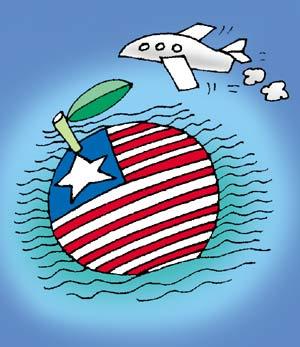Photographs: Rediff Archives Tania Kishore Jaleel
Put the four Cs -- country, course, college and cost -- in place, and you will sail through
A foreign degree or course is a dream for most students. No wonder, even parents set it as a financial goal and start saving for it early. For a foreign degree course, you have to have good grades in SAT and TOEFL. Then comes choosing the degree or course, arranging for funds, getting a visa and so on...
Arun Jacob, managing director, Array Globe Consultancy says there are 'four Cs' to keep in mind -- 'country, course, college and cost.' The country is important because there should be job opportunities. The shortlist, as a result, of the top five destinations are USA, United Kingdom, Australia, New Zealand and Canada.
There are sector-specific qualifications as well. For instance, Switzerland has a shortage of skilled manpower in the hospitality sector but they have institutes that have specialised courses in it.
Then comes college education. There are three types: Universities, polytechnics and private colleges.
The third C, course. Do not select one because it is in vogue. Working out the right permutation and combination is important while selecting the course and country. Hyderabad-based A Mahesh has started his admission process to go to Australia to pursue his management studies. Why Australia?
"In the USA, it is quite difficult to get admission for an MBA if you are from a non-management background. In Australia it is not the case," Mahesh explains.
Tip 1: Get the right combination of country and course
Hurdles to cross for your foreign degree
Photographs: Rediff Archives
Last, perhaps the most important one, cost. This is a question you and your parents need to answer well before the family goes through the rigmarole of choosing the right country, course and other things.
Banks will give you a loan up to Rs 20 lakh. The cost: US universities charging $15,000 to $50,000 (approximately Rs 8.46 lakh to Rs 28.21 lakh) for a year. In the UK, course fees range between 7,000 pounds and 25,000 pounds a year (approximately Rs 6.11 lakh and Rs 21.84 lakh).
First, you need documents for the bank loan. "One needs the I20 (which the university you apply to will give), the admission letter and information of the fee structure. You will also need to give a copy of your visa and passport," lists out Ram Sangapure, GM-retail banking, Central Bank of India.
Loan applications can be rejected, too. If there are some doubts about the university (that is, if the university is not recognised) or there are courses such as post-graduate diplomas and vocational courses, banks might not sanction the loan.
Buying a life insurance policy, with the loan is a necessity in most cases. And, of course, travel insurance, especially since several foreign universities insist on it. "Most insurance companies base their premia on the range of coverage, the region and duration of travel," says Neelesh Garg, executive director, ICICI Lombard General Insurance.
Tip 2: Opt for an insurance policy in India, as premiums are lower. Most of the student travel insurance policies available in India include covers for medical expenses and accident covera#8805 loss of personal possessions; personal liability; student interruption and bail bond.
Hurdles to cross for your foreign degree
Photographs: Rediff Archives
Getting the visa is the most nerve-wracking experience. It is advisable to start the process at least four months before you go or as soon as you get your I20 form.
Education consultants come handy here. They will guide you through the entire process of how to fill your visa forms, the documents needed and how to perform in visa interviews, if required. "If you submit the necessary documentation, it should be smooth sailing," says Naveen Chopra, promoter, The Chopras.
But you could get rejected as well. Says Judith George, who had applied for a visa to go to the UK to study at the London School of Economics, "My visa was rejected as the consulate thought that my finances (fixed deposit) could not be accessible at any time." That is, it is not very liquid. So, she had to get a letter from her bank stating that the FD can be liquidated at anytime by paying a small penalty. "I reapplied with the letter from the bank, and it got accepted." The reapplication fee: Rs 11,000. There could be other reasons like your statement of purpose being not good enough, absence of adequate English, your academic track record not good enough and so on.
Gaurav Badkar, who is getting ready to leave for Michigan University, USA, in August, suggests getting to the visa interview nice and early. "This is because the interviewers are fresh and there are higher chances of them accepting your visa."
Tip 3: Go early for visa interviews. After all that is in place, there are other aspects that one should take care. Book your tickets to get there well in advance to reduce travel costs. If things go wrong, you can always cancel.
Happy studying!





Comment
article